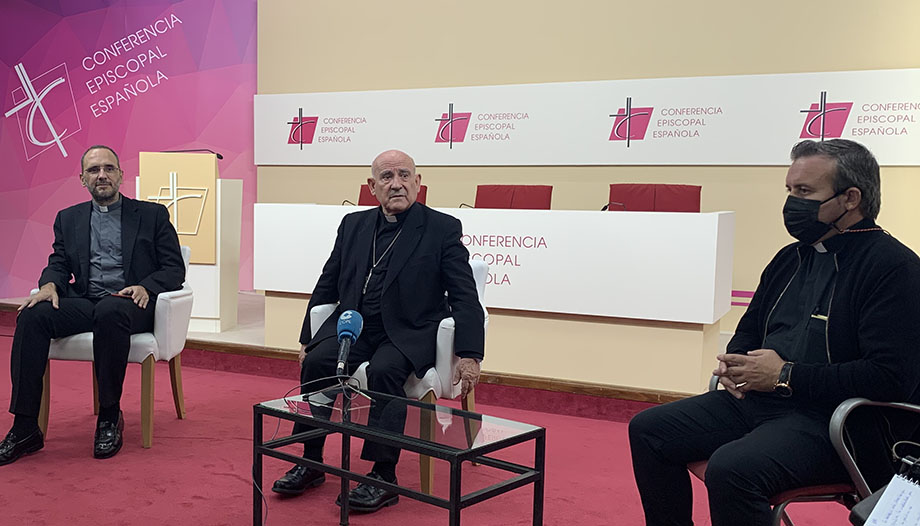Bishop Vicente Jiménez ZamoraArchbishop Emeritus of Zaragoza, shared a meeting with journalists at the headquarters of the Spanish Episcopal Conference in which he shared the first steps that are being taken in our country for the celebration of the next Synod of Bishops entitled "For a Synodal Church: communion, participation and mission", which will take place in Rome in 2023.
"The Church is synodal in its DNA."
The bishop in charge of coordinating the Synod in the EEC recalled that "the Church is synodal since its birth, it is in its DNA and we see it especially in the first steps of the Church". He also emphasized that this process is "a path of listening and participation that, in the end, will return again to the particular Churches". In this case, he stressed, the Pope has given "a modality, which is that this Synod is not only of the bishops, a one-time meeting in Rome, but it is a process that begins in dioceses around the world with the participation of all. A participation of "inverted pyramid" for which it is intended to include the parishes, through their councils, faithful...etc., that link with diocesan teams in charge of this mission and that will be those who, in turn, will have contact with the team formed in the Episcopal Conference for this purpose.
Bishop Vicente Jiménez Zamora admitted that it is not an easy path. On the one hand, "there are dioceses that have already held diocesan synods and know these mechanisms of listening and participation, in others pastoral plans have been made through dialogue with various groups, but not all have this synodal system equally learned". In order to make this process known, communication actions are planned, such as leaflets, informative videos, campaigns, etc., which will help to create what he called "a synod culture".
"The important thing is that we enter into this journey together, with everyone and also with those who are not part of the Church," stressed the Archbishop Emeritus of Zaragoza on several occasions, who also stressed that the synod "is not a popular assembly, but rather it is taking the pulse of how the Church feels and how it wants to walk with others". "The method is listening and the purpose is to discern what the Church has to give to the world and society," he said.
An agenda suitable for those who are not part of the Church
One of the objectives of this synodal journey promoted by Pope Francis is to know the concerns and opinions about the Church of those who are not part of it. As Bishop Vicente Jiménez Zamora admitted, "the institutions or the paths in the dioceses are more or less clear, but reaching out to those outside, to those who are not part of the Church, requires creativity. We have some channels already open, through the labor or prison ministry, but we cannot stay there. Besides, we have to make a process of listening, of dialogue, not of discussion...".
In this line he wanted to emphasize that in the thematic nuclei that have been prepared "no question has been avoided, the more everything comes to the surface, the better. We must not be afraid and give the floor to everyone, because even outsiders evangelize us. We see it in the Gospel with examples such as the Canaanite woman or the centurion" and he admitted that perhaps "we have to prepare other themes for those who are not part of the Church, because the languages are different and we have to create bridges".
Avoiding self-referentiality, which is a very easy temptation, is one of the key objectives of this synod in which, as Bishop Jiménez Zamora pointed out, "we do not know what will come out of it".
The synod team
Bishop Vicente Jiménez Zamora presides over the synodal team that has been created in the EEC to serve as liaison both with the Holy See, through Bishop Luis Marín, and with the Spanish dioceses and the Archbishopric of Castrense, and during these days in which the bishops of the Permanent Commission are meeting, he is in charge of informing the prelates of this process.
Jiménez Zamora highlighted the variety of the team formed in the EEC to coordinate the tasks of the synodal journey in Spain. The team, in addition to himself as president, is made up of Msgr. Luis Argüello, Secretary General of the EEC; Isaac Martín, layman of the diocese of Toledo; Olalla Rodríguez, laywoman of the Catholic Charismatic Renewal; Dolores García, president of the Forum of the Laity; Luis Manuel Romero, priest, director of the Episcopal Commission for the Laity, Family and Life; María José Tuñón ACI, religious, director of the Episcopal Commission for Consecrated Life; and Josetxo Vera, director of the Episcopal Commission for Social Communications.









